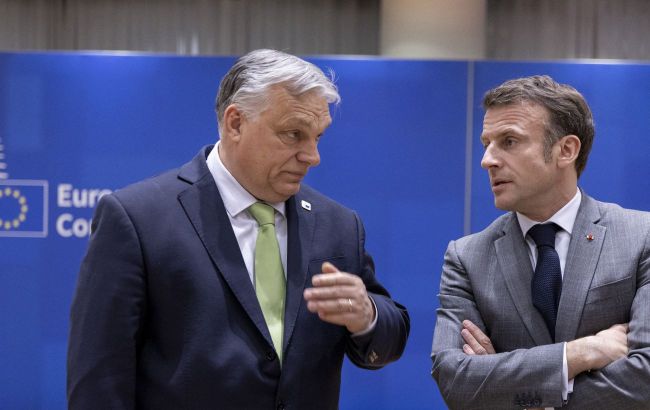Hungary finds surprising allies in bid to block Ukraine from joining EU - Politico
 Photo: Viktor Orbán and Emmanuel Macron (Getty Images)
Photo: Viktor Orbán and Emmanuel Macron (Getty Images)
Hungarian Prime Minister Viktor Orbán may find unexpected support in his attempt to stop Ukraine’s accession to the EU, including from French President Emmanuel Macron, reports Politico.
Costa’s proposal and EU countries’ reaction
Ahead of the EU leaders’ summit in Copenhagen on October 1, European Council President António Costa is holding negotiations to find a way to bypass Hungary’s veto. His initiative concerns not only Ukraine but also other blocked membership applications.
As Politico previously reported, the Portuguese politician proposed changing EU rules and starting accession talks after approval by a qualified majority, instead of a unanimous decision as is the case now.
However, the plan sparked controversy. Orbán, considered the European leader closest to Vladimir Putin, is against Ukraine, but other countries also want to preserve the veto right. Among them are France, the Netherlands, and Greece.
EU countries’ concerns
Diplomats note that changing the rules would deprive countries of the ability to block unwanted applications. For Greece, it is important to retain control over the negotiation process regarding Türkiye, Bulgaria wants to be able to slow down North Macedonia, and Croatia – Serbia.
According to sources, Costa’s proposal would open the way forward not only for Ukraine but also for Moldova, whose applications are linked. But to change the rules, all 27 EU countries, including Hungary, must give consent, which makes the initiative unlikely.
EU support for Ukraine
Meanwhile, a number of EU leaders are strengthening support for Ukraine and Moldova. European Commission President Ursula von der Leyen has repeatedly stressed that Ukraine “belongs to the EU” and stated that Kyiv could become a full member by 2030 if reforms are implemented.
Ukraine has already carried out judicial reforms and is negotiating with Brussels, but the process has not formally begun due to Hungary’s veto. Moldova is in a similar situation, with its progress directly depending on the decision regarding Ukraine.
Hidden interests and the veto
Costa’s initiative was supported by the European Commission, which recognizes that the current procedure with more than a hundred stages of unanimous voting is overly complicated. His idea is to use a qualified majority at interim stages, while keeping unanimity for the final decision.
However, resistance from countries is strong. Greece said it treats the proposal “very cautiously.” Macron earlier told Erdoğan directly that Türkiye would not enter the EU. Bulgaria and Croatia also do not want to lose the ability to block their neighbors.
“Obviously the Hungarians are blocking the Ukrainians,” one EU diplomat said. “But that’s not all. The Bulgarians want to be able to block the Macedonians, the Croats want to be able to control the Serbs, Greece and Cyprus don’t want Türkiye to come any closer to the EU, and Greece also would want to keep an eye on Albania.”
Publicly, many leaders condemn Hungary, but in fact, they find it convenient to use its veto to protect their own interests.
According to the Financial Times, the EU is discussing a temporary bypass of Hungary’s veto on accession talks. The European Commission proposed adjusting its rules and starting technical work on several clusters even without a formal decision. This would make it possible to advance reforms and bring the legislation of Ukraine and Moldova closer to European standards.
According to Eurobarometer data for spring 2025, 60% of European Union residents approve granting candidate status to Ukraine, while 34% of respondents are against.

